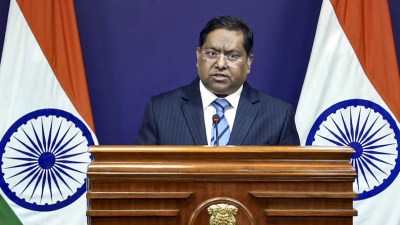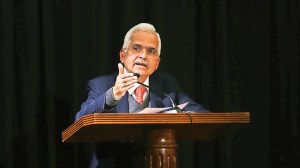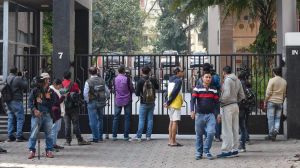America confronts its own principles
When Jaswant Singh arrives in New York on the weekend ostensibly for the UN drugs summit, his meetings on the margins will reveal great will...

When Jaswant Singh arrives in New York on the weekend ostensibly for the UN drugs summit, his meetings on the margins will reveal great willingness by those working to broaden Indo-US relations to distill the good from India8217;s nuclear tests. They will privately express relief that Pakistan has spared them the embarrassment of joining the 8220;punish India8221; chorus.
It is quite extraordinary that a nuclear weapons convention should have been mooted by New Delhi at the same time that the idea was germinating in important UN conclaves. This coincidence must be placed on the credit side of our diplomatic balance sheet. Of course, there is also the debit side. India forced the Pakistanis to go nuclear, it will be argued. The Pakistanis become big cats in forums like the OIC. In SAARC, if the Colombo Summit is held on schedule in July, there will be two nuclear powers at the table. Likewise at the NAM summit in South Africa.
In the absence of new strategic thinking from Washington, the media has seen the situationas an Indo-Pak match. But for serious policy thinkers China is very much in the equation. Rep. Dick Armey, Majority leader in the House of Representatives, in a prime-time TV interview justified India8217;s explosions in the context of US-abetted Sino-Pak collusion. Former ambassador to India Senator Daniel Patrick Moynihan is of the same persuasion and feels the events in South Asia should have a sobering effect on American evaluation of itself. 8220;The Russians would have more influence on New Delhi than we do and as for our influence on Pakistan, well, you saw how much influence the President had.
8220;India is a major country basically friendly to the US. While some sanctions are mandated by Congress, some are necessary for our non-proliferation policy, we ought to look two to three years down the road 8230;I think major sanctions are probably a mistake. Some reaction, limited in time, somewhat costly to India, is understandable, but we should not let this thing drag us into a long confrontation. It would behelpful if India joined the Comprehensive Test Ban Treaty. I don8217;t believe that China has any intention of attacking India with nuclear weapons, but the conventional wisdom has been that deterrence between countries of that size works.8221;
Philip Bowering8217;s essay on the subject deserves to be quoted: 8220;India has put up with neighbours8217; provocations for a long time. For 24 years it buckled under western pressure8230;It has got scant reward for this. China has not only continued with its own programme of tests, it has persistently evaded US attempts to limit the development of Pakistan8217;s middle capability which has been catching up with India8217;s. By at least calling a spade a spade, India may have brought the nuclear issue back to reality and forced the United States to confront its own principles and priorities.8221;
India8217;s nuclear explosion has set off a debate with potentially such far-reaching consequences 8212; mostly favourable to us 8212; that it takes nerve to stay the course and not be distracted by rewardsor punishment. We would waste the advantage if we struck easy deals which terminated the debate.In a thoughtful phone-in TV show Michael Lind, Washington Editor of Harper8217;s Magazine, was asked by two callers why no attention had been paid to the arms and the Islamic extremism the US left behind in Afghanistan 8212; which Pakistan was exploiting to plague India? Lind agreed that this must be focused on. The basic issue, in other words, was not Kashmir but transborder terrorism. This is the first time I have seen an all-American discussion touch on this theme.
Abe Rosenthal, former editor of the New York Times, told me that the limited attention span in the traditional American indifference to South Asia could only register simplistic formulations 8212; like Pakistan8217;s case on Kashmir. To fulfil the two-nation theory Pakistan must possess Muslim-majority Kashmir. But India has more Muslims and subscribing to the two-nation theory would entail its dismemberment. The complex Indian case demands greaterattention. He is not the only one talking on these lines.
Jaswant Singh will find that there is an effort, egged on by Islamabad, to internationalise Kashmir in the context of 8220;new dangers in South Asia8221;. Once the proxy war ends there will be automatic movement on the bilateral track which covers Kashmir too. That should be our script.
- 01
- 02
- 03
- 04
- 05































